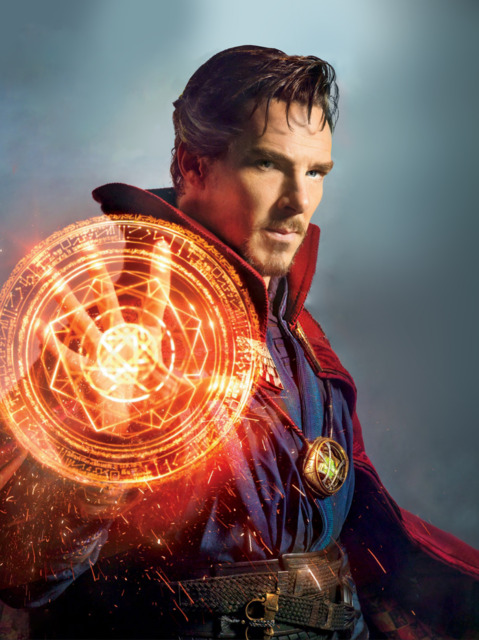I read somewhere that Marvel had just made the 13th
successful blockbuster in a row. It speaks to the strength of the
brand. True, it has a tremendous advantage in having a backlog of
sixty years of story and the built-in audience to boot over other
great brands such as Pixar, but that shouldn’t take away from the
great franchise craft that can be found in these movies. “Dr.
Strange” is one of my favorites already. It was so good that I saw
it twice in a theater and took my family to see it over Thanksgiving.
Blockbusters are mainly to be seen for Spectacle. Spectacle should be
big but also unique as should convey a sense of awe on the viewer.
Given the consistent multitude of Spectacles that all look alike it
is hard for any single one to have a great deal of their impact. A
city being blown up hardly excites me anymore. I’ve already seen it
many times.“Dr. Stange” to its great credit, showed me Spectacle
I had never seen before. It was awesome.
To explain how, here is a character from the movie: “The Avengers
protect the world from more physical dangers. We protect the world
from supernatural forces from other worldly dimensions.” Like many
comic books, “Dr. Strange” melds modern science with ancient
bullshit. Dr. Strange practices magic but this magic comes in the
form of 21st century mathematical babbel about relativity,
the multiverse, and particle physics. The audience hardly understands
either so I guess it makes sense to put them together. Anyway during
certain fight scenes, the magic works less on the participants of the
fight than on their surroundings. Spells are casts and buildings fold
up and down, the axis of the world tilts, gravity goes every which
way, and then everything splits up in a crazy fantastical
kaleidoscopic effect. You really have to see it to believe it. I was
blown away a couple of times by what was going on.
What makes it great of course is not necessarily that things are
crazy, but that these things are explained, have rules, and follow
them. The biggest laugh in the movie contains a fight between two
ghosts of two physically comatose people in a hospital emergency
room. How the movie gets there is just superb story-telling. It is a
very nice ‘aha!’ moment.
Dr. Stephen Strange of course believes none of this in the beginning.
He is a famous and successful brain surgeon dedicated to science.
Like many Marvel Superheroes, his main flaw is arrogance (an all too
common flaw for superheroes I still believe) and after an accident
that ruins his hands, he humbles himself and seeks help from The
Ancient One who lives in a monastery in Tibet. The background of
these training scenes are perhaps more interesting than what takes
place during them as it illustrates the benefits and limitations of
corporate marketing.
This Tibetan monastary is an exceptionally diverse Tibetan monastary.
The three main wizards are a Black Man named Mordo (Chiwetal
Ejiofor), a Chinese man (Benedict Wong), and a Woman (Tilda Swinton).
There are a multitude of others in the background. I spotted a
Japanase guy somewhere at some point. White men are represented by
our main protagonist, Dr. Steven Strange (Benedict Cumberbatch
playing another snarky genius) and our main antagonist, Kaecilius
(Mads Mikkelson). Everybody seems to be here except, well, Tibetans.
Now the Tilda Swinton character, The Ancient One, used to be Tibetan
in the comic book. But she was changed to a Celtic sorceress in the
movie. Why? Well, one of the main markets for Marvel movies is China
and the Chinese don’t like it when you say good things about
Tibetan monks. Also notice that the three main sanctuaries for the
wizards are located in New York, London, and Hong Kong. Now why would
these three locations be all that special in terms of magic. The
answer is they aren’t. What these three places happen to have in
common is that they are major financial hubs, the three biggest in
the world actually.
You can take a look at this and see crass manipulation of character
and location for marketing reasons and corporate gain as well as
craven capitulation in the face of a corrupt Chinese government. But
you can look at the glass half-full as well. For instance, when
corporations try to make as money as possible, they follow a strategy
of inclusion. So these stories contain as many different and diverse
people as possible. And really its the Chinese government, not
Marvel, that are jerks at the end of the day. If Marvel wasn’t
being pressured (i.e. the market was more free in China) The Ancient
one would have remained Tibetan and we would have all enjoyed a movie
that would have been even more cosmopolitan.
p.s. Conveniently, I can date back the start of the Marvel Universe
(I put that at 2008’s Iron Man) with my arrival in New York. Yes,
every time the Avengers and their enemies destroyed New York City, I
was living there.

